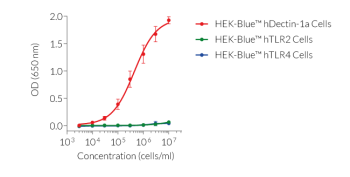Anti-hDectin-1-mIgG1
-
Cat.code:
mab9-hdect1
- Documents
ABOUT
Recombinant anti-human Dectin-1 neutralizing and detection antibody
Anti-hDectin-1-mIgG1 is a monoclonal antibody (mAb) targeting human Dectin-1. This antibody was screened for neutralization activity and flow cytometry (see figures). Anti-hDectin-1-mIgG1 was previously extracted from hybridoma cells (clone 22H8). It is now expressed and produced in Chinese hamster ovary (CHO) cells, ensuring reliability and lot-to-lot reproducibility. Anti-hDectin-1-mIgG1 recognizes hDectin-1 isoforms A and B.
This antibody can be used together with HEK-Blue™ hDectin-1b Cells for screening and neutralization assays to block hDectin-1 signaling in response to stimulation by Dectin ligands.
Key features
- Each lot is functionally tested and validated.
- The complete sequence of the antibody construct has been verified.
- The absence of endotoxins is determined by the EndotoxDetect™ assay.
Dendritic cell-associated C-type lectin-1 (Dectin-1) is a C-type lectin receptor (CLR) that recognizes β-glucans, glucose polymers found in the cell walls of fungi, and thus plays an important role in antifungal innate immunity. Dectin-1 is encoded by the C-type lectin domain family 7 member A (CLEC7A) gene and alternatively spliced into 2 major isoforms: a full-length A isoform and a ‘stalkless’ B isoform, which do not induce the same response to soluble and particulate β-glucans [1, 2].
The hybridoma-derived Anti-hDectin-1-IgG (mabg-hdect-2) antibody has been replaced by Anti-hDectin-1-mIgG1 (mab9-hdect1), which is produced by recombinant technology and purified from CHO cells.
![]() Read our review on Dectin-1 & β-glucans.
Read our review on Dectin-1 & β-glucans.
![]() Read our review on Dectin-1 & inflammasomes.
Read our review on Dectin-1 & inflammasomes.
References:
1. Brown G.D. et al., 2003. Dectin-1 mediates the biological effects of beta-glucans. J Exp Med. 197: 1119- 24.
2. Heinsbroek S.E. et al., 2006. C-type Lectin Receptor: Old Friend and New Player. Med Chem. 2017;13(6):536-543.
All products are for research use only, and not for human or veterinary use.
SPECIFICATIONS
Specifications
Dectin-1, CLEC7A
Human
Blocking assays, detection assay
Sodium phosphate buffer, saccharose, glycine, stabilizing agents
Negative (tested using EndotoxDetect™ assay)
Neutralization assay, flow cytometry
Each lot is functionally tested and validated.
CONTENTS
Contents
-
Product:Anti-hDectin-1-mIgG1
-
Cat code:mab9-hdect1
-
Quantity:100 µg
Shipping & Storage
- Shipping method: Room temperature
- -20°C
- Avoid repeated freeze-thaw cycles
Storage:
Caution:
Details
Dectin-1 is a member of the C-type lectin receptor (CLR) family and plays an important role in antifungal innate immunity. In humans and mice, it is alternatively spliced into two major isoforms, a full-length A isoform and a ‘stalkless’ B isoform [1, 2]. It is expressed on phagocytic cells, including macrophages and neutrophils.
Dectin-1 is a specific receptor for β-glucans [2]. β-Glucans are glucose polymers found in the cell wall of fungi, including the yeasts Saccharomyces cerevisiae and Candida albicans. Upon binding to its ligand, Dectin-1 triggers phagocytosis and signaling through the kinase Syk and the adaptors CARD9-Bcl10-Malt1 leading to the production of reactive oxygen species (ROS), activation of NF-κB and subsequent production of pro-inflammatory cytokines [3].
Notably, Dectin-1 signaling has been shown to collaborate with Toll‑like receptor 2 (TLR2) signaling to enhance the responses triggered by each receptor [4].
1. Fischer M. et al., 2017. Isoform localization of Dectin-1 regulates the signaling quality of anti-fungal immunity. Eur J Immunol. 47(5):848-859.
2. Hou H. et al., 2017. C-type Lectin Receptor: Old Friend and New Player. Med Chem. 13(6):536-543.
3. Drummond RA. & Lionakis MS., 2016. Mechanistic Insights into the Role of C-Type Lectin Receptor/ CARD9 Signaling in Human Antifungal Immunity. Front Cell Infect Microbiol. 6:39.
4. Romero MM. et al., 2016. Reactive oxygen species production by human dendritic cells involves TLR2 and dectin-1 and is essential for efficient immune response against Mycobacteria. Cell Microbiol. 18(6):875-86.
DOCUMENTS
Documents
Technical Data Sheet
Safety Data Sheet
Validation Data Sheet
Certificate of analysis
Need a CoA ?






